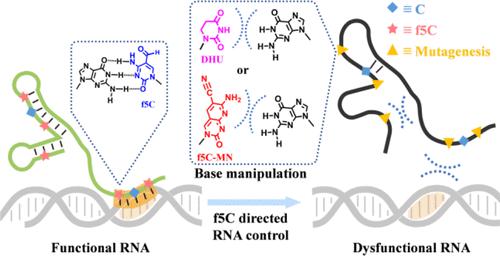当前位置:
X-MOL 学术
›
J. Am. Chem. Soc.
›
论文详情
Our official English website, www.x-mol.net, welcomes your
feedback! (Note: you will need to create a separate account there.)
Utilizing Epigenetic Modification as a Reactive Handle To Regulate RNA Function and CRISPR-Based Gene Regulation
Journal of the American Chemical Society ( IF 14.4 ) Pub Date : 2023-05-16 , DOI: 10.1021/jacs.3c01864 Qianqian Qi 1 , Xingyu Liu 1 , Fang Fu 1 , Wei Shen 1 , Shuangyu Cui 1 , Shen Yan 1 , Yutong Zhang 1 , Yuhao Du 1 , Tian Tian 1 , Xiang Zhou 1
Journal of the American Chemical Society ( IF 14.4 ) Pub Date : 2023-05-16 , DOI: 10.1021/jacs.3c01864 Qianqian Qi 1 , Xingyu Liu 1 , Fang Fu 1 , Wei Shen 1 , Shuangyu Cui 1 , Shen Yan 1 , Yutong Zhang 1 , Yuhao Du 1 , Tian Tian 1 , Xiang Zhou 1
Affiliation

|
The current methods to control RNA functions in living conditions are limited. The new RNA-controlling strategy presented in this study involves utilizing 5-formylcytidine (f5C)-directed base manipulation. This study shows that malononitrile and pyridine boranes can effectively manipulate the folding, small molecule binding, and enzyme recognition of f5C-bearing RNAs. We further demonstrate the efficiency of f5C-directed reactions in controlling two different clustered regularly interspaced short palindromic repeat (CRISPR) systems. Although further studies are needed to optimize the efficiency of these reactions in vivo, this small molecule-based approach presents exciting new opportunities for regulating CRISPR-based gene expression and other applications.
中文翻译:

利用表观遗传修饰作为反应手段来调节 RNA 功能和基于 CRISPR 的基因调控
目前在生活条件下控制 RNA 功能的方法是有限的。本研究中提出的新 RNA 控制策略涉及利用 5-甲酰胞苷 (f5C) 定向碱基操作。这项研究表明,丙二腈和吡啶硼烷可以有效地控制携带 f5C 的 RNA 的折叠、小分子结合和酶识别。我们进一步证明了 f5C 定向反应在控制两个不同的成簇规则间隔短回文重复 (CRISPR) 系统方面的效率。尽管需要进一步研究来优化这些体内反应的效率,但这种基于小分子的方法为调节基于 CRISPR 的基因表达和其他应用提供了令人兴奋的新机会。
更新日期:2023-05-16
中文翻译:

利用表观遗传修饰作为反应手段来调节 RNA 功能和基于 CRISPR 的基因调控
目前在生活条件下控制 RNA 功能的方法是有限的。本研究中提出的新 RNA 控制策略涉及利用 5-甲酰胞苷 (f5C) 定向碱基操作。这项研究表明,丙二腈和吡啶硼烷可以有效地控制携带 f5C 的 RNA 的折叠、小分子结合和酶识别。我们进一步证明了 f5C 定向反应在控制两个不同的成簇规则间隔短回文重复 (CRISPR) 系统方面的效率。尽管需要进一步研究来优化这些体内反应的效率,但这种基于小分子的方法为调节基于 CRISPR 的基因表达和其他应用提供了令人兴奋的新机会。











































 京公网安备 11010802027423号
京公网安备 11010802027423号